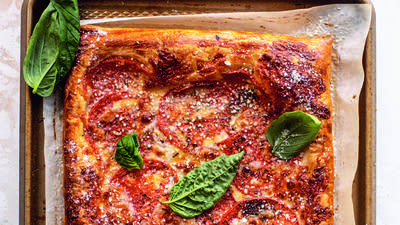
Emma Piper-Burket is a young American food activist who in 2009 found herself in Iraq in the midst of the war, trying to help a broken farm system.
She had heard that Iraq’s seed bank was destroyed. Programs to help farmers such as Oil-for-Food weren’t working. Then she got an idea: The Iraqi Seed Project. Her latest venture is a web documentary about agriculture in Iraq and Iraqi Kurdistan called This is Fertile Ground.
Lynne Rossetto Kasper: We talked in 2010, but could you recap for us how you got this idea in the first place and what you did?
Emma Piper-Burket: In April of 2009 I made my first trip to Iraq. I was working on an online cooking show called Kitchen Caravan that I started with a friend, and we were in the Middle East doing some episodes about food production in the region. I found myself in Iraq recording some local recipes. I started learning more and more about the farming system there and how it was the birthplace of wheat 10,000 years ago -- that’s where it was first cultivated. Now they were importing it from the U.S. and Australia. Little pieces of information like that struck me as very important to let people know about what was happening.
 Emma Piper-Burket
Emma Piper-Burket
LRK: There was a war going on in 2009.
EPB: Yes. I went to the northern area by myself. There wasn’t really violence in that same way after the 2003 invasion, so I actually felt really safe.
LRK: So what did you do there?
EPB: After that I started reading more, trying to learn about the history, trying to learn about what was happening then, talking to people who were working in different ways and just trying to document in small ways. I made three trips and I would record a little bit every time, talking to farmers, talking to government officials, trying to figure out what was going on. Even though farming is a really important part of the Iraqi economy, there’s not a lot of information about what is actually happening on the ground, so I had to do a lot of that for myself. I’m still working on that part.
LRK: What did you discover? In the midst of a war could Iraq feed itself?
EPB: I think that with the Oil-for-Food program and the wars that have been happening in the area since the 1980s, the agricultural sector has pretty much been at a bit of a standstill for the past 30 years. Now as we hear a lot about the reconstruction, agriculture’s obviously a big part of that. In a lot of ways it feels like they’re starting from scratch, which is really strange when you think about the history they’re coming from.
LRK: Because this was the cradle of civilization. This is an area where many of the legumes that we all eat originally came from. Wheat, grapes and...
EPB: Lentils. There’s the documentation part of it, and then there’s also trying to create this platform for exchange. I think that will probably take a lot of different forms. Our web documentary, This is Fertile Ground, is in English and Arabic and Kurdish, just to try to get people to be able to actually see what is happening with farming in Iraq right now.
It’s a series of very short videos that do not play in any particular order. It’s just trying to give people an overview in many different areas. As people watch these videos, we have some animations of native Iraqi crops and they will start sprouting and growing. The idea is that by learning and watching, we’re kind of revitalizing the farm idea. It’s a symbolic thing, but it’s just one small step.
LRK: What will it feel like to you if things don’t change?
EPB: I think that would be sad. I think we have a lot to learn from the farmers there. Right now, it feels like they’re starting from scratch, so they’re very ready to adopt new technology and new techniques. But I guess there’s a part of me that feels anxious that I don’t want them to lose the traditions that they have in the haste to get started again.
 Harvesting wheat
Harvesting wheat
LRK: This is not something, as you said, that’s unique to Iraq?
EPB: No. I think it’s a phenomenon that’s happening everywhere. On this last trip I got really determined: I’m going to find young people who are interested in farming. I was there for 3 weeks and we could not find one. That, to me, was sad. That’s something that I think is obviously very reflective of everything that’s happening in the rest of the world, too. Young people want to live in the cities, they want fancy cars and they don’t want to be part of that agrarian lifestyle. I feel like in this country we’re starting to see that change a little bit. Farming is actually getting to be kind of cool. If I can share that -- the coolness of farming in this country -- with Iraqi youth, I’ll feel like I’m very successful.
Before you go...
Each week, The Splendid Table brings you stories that expand your world view, inspire you to try something new, and show how food connects us all. We rely on your generous support. For as little as $5 a month, you can have a lasting impact on The Splendid Table. And, when you donate, you’ll join a community of like-minded individuals who love good food, good conversation, and kitchen companionship. Show your love for The Splendid Table with a gift today.
Thank you for your support.
Donate today for as little as $5.00 a month. Your gift only takes a few minutes and has a lasting impact on The Splendid Table and you'll be welcomed into The Splendid Table Co-op.




